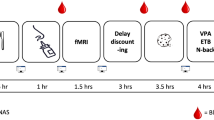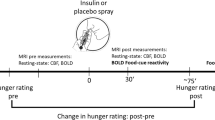Abstract
Context and objective:
Insulin acts in the brain to reduce food intake and body weight and is considered a major adiposity signal in energy homeostasis. In normal-weight men, intranasal insulin administration reduces body fat and improves declarative memory. The present experiments aimed to generalize these findings to obese patients, with a view to evaluate the therapeutic potential of the compound.
Design, subjects and measurements:
Insulin and placebo, respectively, were intranasally administered four times a day (amounting to 160 IU day−1) over 8 weeks to two groups of 15 obese men each.
Results:
Contrasting with the catabolic effects in normal-weight men, insulin treatment did not induce any significant reduction of body weight (P>0.50) and body fat (P>0.44) in the obese subjects. However, in accordance with the effects in normal-weight men, declarative memory and mood were improved (P<0.05) and hypothalamic–pituitary–adrenal axis activity as assessed by circulating ACTH (P<0.01) and cortisol levels (P<0.04) was reduced.
Conclusions:
Our results indicate that in obese men, intranasal insulin is functionally active in the central nervous system but fails to affect the neuronal networks critically involved in body weight regulation. We conclude that obesity in men is associated with central nervous resistance to the adiposity signal insulin. This defect likely contributes to the persistence of obesity in spite of elevated levels of circulating insulin in obese patients.
This is a preview of subscription content, access via your institution
Access options
Subscribe to this journal
Receive 12 print issues and online access
$259.00 per year
only $21.58 per issue
Buy this article
- Purchase on Springer Link
- Instant access to full article PDF
Prices may be subject to local taxes which are calculated during checkout


Similar content being viewed by others
References
Yach D, Stuckler D, Brownell KD . Epidemiologic and economic consequences of the global epidemics of obesity and diabetes. Nat Med 2006; 12: 62–66.
Schwartz MW, Porte Jr D . Diabetes, obesity, and the brain. Science 2005; 307: 375–379.
Woods SC, Lotter EC, McKay LD, Porte Jr D . Chronic intracerebroventricular infusion of insulin reduces food intake and body weight of baboons. Nature 1979; 282: 503–505.
Air EL, Benoit SC, Blake Smith KA, Clegg DJ, Woods SC . Acute third ventricular administration of insulin decreases food intake in two paradigms. Pharmacol Biochem Behav 2002; 72: 423–429.
Park CR, Seeley RJ, Craft S, Woods SC . Intracerebroventricular insulin enhances memory in a passive-avoidance task. Physiol Behav 2000; 68: 509–514.
Kern W, Peters A, Fruehwald-Schultes B, Deininger E, Born J, Fehm HL . Improving influence of insulin on cognitive functions in humans. Neuroendocrinology 2001; 74: 270–280.
Reger MA, Watson GS, Frey WH, Baker LD, Cholerton B, Keeling ML et al. Effects of intranasal insulin on cognition in memory-impaired older adults: modulation by APOE genotype. Neurobiol Aging 2006; 27: 451–458.
Benedict C, Hallschmid M, Schmitz K, Schultes B, Ratter F, Fehm HL et al. Intranasal insulin improves memory in humans: superiority of insulin as part. Neuropsychopharmacology 2007; 32: 239–243.
Benedict C, Hallschmid M, Hatke A, Schultes B, Fehm HL, Born J et al. Intranasal insulin improves memory in humans. Psychoneuroendocrinology 2004; 29: 1326–1334.
Baura GD, Foster DM, Porte Jr D, Kahn SE, Bergman RN, Cobelli C et al. Saturable transport of insulin from plasma into the central nervous system of dogs in vivo. A mechanism for regulated insulin delivery to the brain. J Clin Invest 1993; 92: 1824–1830.
Stein LJ, Dorsa DM, Baskin DG, Figlewicz DP, Porte Jr D, Woods SC . Reduced effect of experimental peripheral hyperinsulinemia to elevate cerebrospinal fluid insulin concentrations of obese Zucker rats. Endocrinology 1987; 121: 1611–1615.
Kaiyala KJ, Prigeon RL, Kahn SE, Woods SC, Schwartz MW . Obesity induced by a high-fat diet is associated with reduced brain insulin transport in dogs. Diabetes 2000; 49: 1525–1533.
Kern W, Benedict C, Schultes B, Plohr F, Moser A, Born J et al. Low cerebrospinal fluid insulin levels in obese humans. Diabetologia 2006; 49: 2790–2792.
Born J, Lange T, Kern W, McGregor GP, Bickel U, Fehm HL . Sniffing neuropeptides: a transnasal approach to the human brain. Nat Neurosci 2002; 5: 514–516.
Thorne RG, Pronk GJ, Padmanabhan V, Frey WH . Delivery of insulin-like growth factor-I to the rat brain and spinal cord along olfactory and trigeminal pathways following intranasal administration. Neuroscience 2004; 127: 481–496.
Hallschmid M, Benedict C, Schultes B, Fehm HL, Born J, Kern W . Intranasal insulin reduces body fat in men but not in women. Diabetes 2004; 53: 3024–3029.
Greenwood CE, Kaplan RJ, Hebblethwaite S, Jenkins DJ . Carbohydrate-induced memory impairment in adults with type 2 diabetes. Diabetes Care 2003; 26: 1961–1966.
Squire LR, Zola SM . Structure and function of declarative and nondeclarative memory systems. Proc Natl Acad Sci USA 1996; 93: 13515–13522.
Plihal W, Born J . Effects of early and late nocturnal sleep on priming and spatial memory. Psychophysiology 1999; 36: 571–582.
Janke W, Debus G . Die Eigenschaftswörterliste (EWL). Hogrefe: Göttingen, 1978.
Jensen AR, Rohwer Jr WD . The stroop color-word test: a review. Acta Psychol (Amst) 1966; 25: 36–93.
Fruehwald-Schultes B, Kern W, Bong W, Wellhoener P, Kerner W, Born J et al. Supraphysiological hyperinsulinemia acutely increases hypothalamic–pituitary–adrenal secretory activity in humans. J Clin Endocrinol Metab 1999; 84: 3041–3046.
De Kloet ER, Vreugdenhil E, Oitzl MS, Joels M . Brain corticosteroid receptor balance in health and disease. Endocr Rev 1998; 19: 269–301.
Jacobson L, Sapolsky R . The role of the hippocampus in feedback regulation of the hypothalamic–pituitary–adrenocortical axis. Endocr Rev 1991; 12: 118–134.
Engler D, Redei E, Kola I . The corticotropin-release inhibitory factor hypothesis: a review of the evidence for the existence of inhibitory as well as stimulatory hypophysiotropic regulation of adrenocorticotropin secretion and biosynthesis. Endocr Rev 1999; 20: 460–500.
Benedict C, Dodt C, Hallschmid M, Lepiorz M, Fehm HL, Born J et al. Immediate but not long-term intranasal administration of insulin raises blood pressure in human beings. Metabolism 2005; 54: 1356–1361.
Park CR . Cognitive effects of insulin in the central nervous system. Neurosci Biobehav Rev 2001; 25: 311–323.
Unger JW, Livingston JN, Moss AM . Insulin receptors in the central nervous system: localization, signalling mechanisms and functional aspects. Prog Neurobiol 1991; 36: 343–362.
Bingham EM, Hopkins D, Smith D, Pernet A, Hallett W, Reed L et al. The role of insulin in human brain glucose metabolism: an 18fluoro-deoxyglucose positron emission tomography study. Diabetes 2002; 51: 3384–3390.
Wagner U, Degirmenci M, Drosopoulos S, Perras B, Born J . Effects of cortisol suppression on sleep-associated consolidation of neutral and emotional memory. Biol Psychiatry 2005; 58: 885–893.
Sapolsky RM . Potential behavioral modification of glucocorticoid damage to the hippocampus. Behav Brain Res 1993; 57: 175–182.
Bisagno V, Ferrini M, Rios H, Zieher LM, Wikinski SI . Chronic corticosterone impairs inhibitory avoidance in rats: possible link with atrophy of hippocampal CA3 neurons. Pharmacol Biochem Behav 2000; 66: 235–240.
Plihal W, Born J . Memory consolidation in human sleep depends on inhibition of glucocorticoid release. NeuroReport 1999; 10: 2741–2747.
Kern W, Born J, Schreiber H, Fehm HL . Central nervous system effects of intranasally administered insulin during euglycemia in men. Diabetes 1999; 48: 557–563.
Stockhorst U, de Fries D, Steingrueber HJ, Scherbaum WA . Insulin and the CNS: effects on food intake, memory, and endocrine parameters and the role of intranasal insulin administration in humans. Physiol Behav 2004; 83: 47–54.
Arase K, Fisler JS, Shargill NS, York DA, Bray GA . Intracerebroventricular infusions of 3-OHB and insulin in a rat model of dietary obesity. Am J Physiol 1988; 255 (Part 1): R974–R981.
El Haschimi K, Pierroz DD, Hileman SM, Bjorbaek C, Flier JS . Two defects contribute to hypothalamic leptin resistance in mice with diet-induced obesity. J Clin Invest 2000; 105: 1827–1832.
Chavez M, Riedy CA, Van Dijk G, Woods SC . Central insulin and macronutrient intake in the rat. Am J Physiol 1996; 271 (Part 2): R727–R731.
Clegg DJ, Brown LM, Woods SC, Benoit SC . Gonadal hormones determine sensitivity to central leptin and insulin. Diabetes 2006; 55: 978–987.
Clegg DJ, Riedy CA, Smith KA, Benoit SC, Woods SC . Differential sensitivity to central leptin and insulin in male and female rats. Diabetes 2003; 52: 682–687.
Figlewicz D, Szot P, Greenwood MR . Insulin stimulates inositol incorporation in hippocampus of lean but not obese Zucker rats. Physiol Behav 1990; 47: 325–330.
Tschritter O, Preissl H, Hennige AM, Stumvoll M, Porubska K, Frost R et al. The cerebrocortical response to hyperinsulinemia is reduced in overweight humans: a magnetoencephalographic study. Proc Natl Acad Sci USA 2006; 103: 12103–12108.
Obici S, Feng Z, Karkanias G, Baskin DG, Rossetti L . Decreasing hypothalamic insulin receptors causes hyperphagia and insulin resistance in rats. Nat Neurosci 2002; 5: 566–572.
Lin X, Taguchi A, Park S, Kushner JA, Li F, Li Y et al. Dysregulation of insulin receptor substrate 2 in beta cells and brain causes obesity and diabetes. J Clin Invest 2004; 114: 908–916.
Bjorntorp P, Rosmond R . Neuroendocrine abnormalities in visceral obesity. Int J Obes Relat Metab Disord 2000; 24 (Suppl 2): S80–S85.
Dallman MF, Pecoraro NC, La Fleur SE, Warne JP, Ginsberg AB, Akana SF et al. Glucocorticoids, chronic stress, and obesity. Prog Brain Res 2006; 153: 75–105.
Fehm HL, Perras B, Smolnik R, Kern W, Born J . Manipulating neuropeptidergic pathways in humans: a novel approach to neuropharmacology? Eur J Pharmacol 2000; 405: 43–54.
Acknowledgements
We thank N Bender, F Weidmann, I von Lützau and C Otten for expert technical assistance. Aero Pump, Hochheim, Germany, provided us with precision nasal air pumps. This work was supported by the Deutsche Forschungsgemeinschaft (SFB 654/B3).
Author information
Authors and Affiliations
Corresponding author
Rights and permissions
About this article
Cite this article
Hallschmid, M., Benedict, C., Schultes, B. et al. Obese men respond to cognitive but not to catabolic brain insulin signaling. Int J Obes 32, 275–282 (2008). https://doi.org/10.1038/sj.ijo.0803722
Received:
Revised:
Accepted:
Published:
Issue Date:
DOI: https://doi.org/10.1038/sj.ijo.0803722
Keywords
This article is cited by
-
The mitochondrial quality control system: a new target for exercise therapeutic intervention in the treatment of brain insulin resistance-induced neurodegeneration in obesity
International Journal of Obesity (2024)
-
Central nervous system insulin signaling can influence the rate of insulin influx into brain
Fluids and Barriers of the CNS (2023)
-
Brain functional and structural magnetic resonance imaging of obesity and weight loss interventions
Molecular Psychiatry (2023)
-
Towards a multilevel model of major depression: genes, immuno-metabolic function, and cortico-striatal signaling
Translational Psychiatry (2023)
-
The effect of intranasal insulin on appetite and mood in women with and without obesity: an experimental medicine study
International Journal of Obesity (2022)



